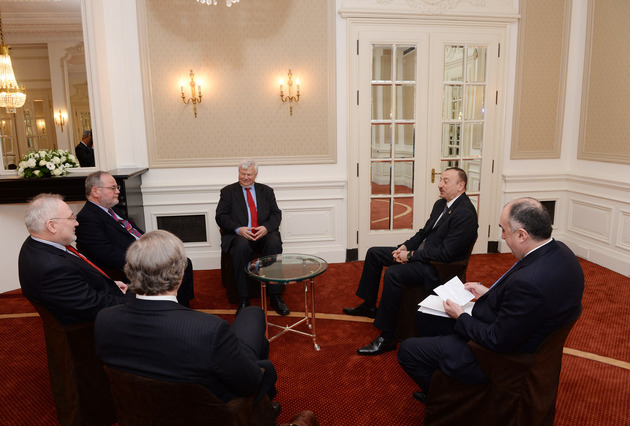
Azerbaijan’s Approach to the Crimean Crisis
Publication: Eurasia Daily Monitor Volume: 11 Issue: 73
By:

The Ukrainian crisis and Russia’s annexation of Crimea have focused the attention of all the post-Soviet states. But especially concerned have been all the countries in the region that have their own internal unresolved conflicts as well as those neighboring states that maintain relations with the North Atlantic Treaty Organization (NATO) and the European Union. The former Soviet republic of Azerbaijan particularly fits this mold. Azerbaijan’s frozen Karabakh conflict continues to simmer with no solution in sight, while over the years the country has developed growing ties with the EU as a member of its Eastern Partnership program and with NATO, having received an Individual Partnership Action Plan (IPAP), which boosted its cooperation potential with the Alliance (https://www.nato.int/cps/en/SID-6CE51279-1855821D/natolive/news_6866.htm?selectedLocale=en).
After Russia completed the annexation of Crimea, Azerbaijan’s position fell largely in line with that of Western countries. Though, in actuality, the country has been simultaneously viewing the crisis in two different ways. The Azerbaijani population has understood the crisis in Ukraine as having been caused by Russian expansionism under Vladimir Putin’s leadership. The government in Baku, on the other hand, has focused more on making sure that Russia’s actions in Ukraine do not further negatively affect the situation in Karabakh or result in any unwanted international legal precedents.
Azerbaijanis felt close to the Ukrainian people in response to the annexation of Crimea because Azerbaijan faced a rather similar situation 25 years earlier with the de facto loss of Karabakh. Meanwhile, Baku deliberately took a principled stance on the situation in Ukraine, in support of the central government in Kyiv, specifically because of the possible precedents the Ukraine crisis could have on Azerbaijan’s Karabakh conflict. So from the beginning of the process, Azerbaijan openly supported Ukraine’s territorial integrity. Indeed, four days after the March 16 Crimean status referendum, Azerbaijani President Ilham Aliyev declared that the territorial integrity of other countries cannot be changed without their permission (https://www.mediaforum.az/az/2014/03/20/%C4%B0lham-%C6%8Fliyev-Erm%C9%99nistan-fa%C5%9Fist-d%C3%B6vl%C9%99tdir-041427950c00.html). It is worth pointing out that this was also the main reason why Azerbaijan has never recognized the independence of Kosovo—essentially adopting the same position as Russia on this issue.
Azerbaijan’s government has been particularly active in pushing support for Ukraine in multilateral organizations. Thus, the Azerbaijani delegation to the Congress of Local and Regional Authorities of the Council of Europe supported a declaration in favor of Ukraine’s central government. In particular, the declaration stated that the Congress condemns Russia’s annexation of Crimea and Sevastopol, which violated international law. “The Congress reiterates its full support for Crimea and Sebastopol [sic] to be an undisputed part of Ukraine and for the integrity of the Ukrainian territory to be restored,” the declaration’s fifth point stated (https://coe.mfa.gov.ua/en/press-center/news/20598-kongres-radi-jevropi-zasudzhuje-rosijsyku-aneksiju-krimu-ta-sevastopolyu).
Azerbaijan also backed Ukraine in the United Nations. Azerbaijani charge de affairs to the UN, Tofig Musayev, stated that his country was supporting Ukraine out of “Azerbaijan’s adherence to the fundamental principles of sovereignty, territorial integrity and inviolability of internationally recognized borders, which constitute the basic foundation of international relations and the international legal order” (https://www.un.org/News/Press/docs//2014/ga11493.doc.htm).
Furthermore, the Ukrainian conflict’s escalation boosted Azerbaijan and Turkey’s high-level policy coordination. Notably, General Nejdet Ozel, the chief of the Turkish General Staff, visited Azerbaijan on April 2 (https://www.trtenglish.com/trtworld/en/newsDetail.aspx?HaberKodu=96988298-7a2a-4e4f-b858-1cf0dd26ea05). And on April 4, Turkish Prime Minister Recep Tayyip Erdogan made a previously unscheduled visit to Baku to discuss a wide variety of issues, including the Karabakh conflict resolution process, joint economic projects, as well as the crisis in Ukraine (https://www.azernews.az/azerbaijan/65779.html).
Azerbaijan’s active interest in and concern over the situation in Crimea and eastern Ukraine has been growing because Russia’s annexation of Ukrainian territory has inadvertently raised the profile of the Karabakh peace process on the global agenda. President Aliyev’s attendance at the Nuclear Security Summit at The Hague on March 24–25, presented Azerbaijan with a useful opportunity to consult with world leaders on the situation in Ukraine and its impact on Karabakh.
During the Nuclear Summit, Ambassador James B. Warlick—the United States’ Co-Chair of the Organization for Security and Cooperation in Europe (OSCE) Minsk Group, which also includes co-chairs France and Russia and is charged with resolving the Karabakh conflict—actively supported Aliyev’s planned future meeting with Armenian President Serzh Sargsyan regarding the Karabakh peace process (https://www.azernews.az/azerbaijan/65471.html). But it also must be noted that Baku is tired of the decades-long status quo on Karabakh and has nearly lost hope that Western countries will actively engage in the Karabakh peace process. Moreover, some of Ambassador Warlick’s recent statements about Karabakh were perceived in Azerbaijan as being pro-Armenian (https://www.regionplus.az/en/articles/view/2094). Azerbaijanis have also been annoyed by the fact that the Western reaction to the Crimea crisis has been significantly more forceful than its reaction over Karabakh’s continued occupation by Armenian forces.
On the other hand, Baku was satisfied with the European Union’s decision to preemptively ban issuing any European travel or work visas to Crimean residents at EU-member embassies and consulates located on Russia territory. This will force Crimeans who wish to visit the EU to apply for visas on Ukrainian soil (https://voiceofrussia.com/news/2014_03_25/EU-visas-banned-for-Crimean-citizens-willing-to-obtain-them-in-Russia-5097/). According to the Azerbaijani media, this precedent will also apply to the residents of the South Caucasus’ unrecognized separatist regions of Karabakh, South Ossetia and Abkhazia. A spokesperson of the Azerbaijani foreign minister stated that the government was ready institute a means for Armenian residents of Karabakh to apply for EU visas in Baku (https://www.regnum.ru/news/1782962.html; https://haqqin.az/news/19191).
Because of the unresolved Karabakh problem, Azerbaijan’s population is particularly security-conscious. Consequently, Azerbaijan continues to seek greater security and political support from its Western partners. But the new geopolitical clash in the region precipitated by Russia’s subversive actions in Ukraine may force Azerbaijan to choose to ally itself explicitly either with the West or with Russia. This would be dangerous and destabilizing to Baku’s balanced foreign policy because a main pillar of Azerbaijan’s regional policy since its independence has been to avoid taking part in geopolitical rivalries. Therefore, for as long as it can, Azerbaijan will maintain its relations with both Western as well as Russian-led organizations.




